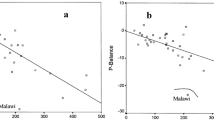Abstract
Shalmali Guttal and Sofia Monsalve argue that climate change will mean a change in local knowledge and resilience, which are at the basis of good agricultural and ecosystem management. Before new ways are found, rural communities are likely to be rendered more vulnerable and dependent on external inputs and techniques, and lose precious local knowledge about food, medicinal plants, soil, water and coastal management, and forest and biodiversity protection. Therefore, public policies and resources must be redirected towards supporting land use and agricultural practices that cool the planet, nurture biodiversity and save energy. These policies will check global warming, achieve food sovereignty and reduce distress out-migration from rural to urban areas.
Similar content being viewed by others
Notes
According to the UN Framework Convention on Climate Change, ‘Climate change’ means a change of climate which is attributed directly or indirectly to human activity that alters the composition of the global atmosphere and which is in addition to natural climate variability observed over comparable time periods (Article 1(2) UNFCCC).
The Fourth Assessment Report, IPCC 2007, Geneva, Switzerland.
First-generation agrofuels are mainly ethanol from grains, sugar crops and biodiesel from oil seeds (such as palm and jatropha) or from recycled cooking oil. Second-generation agrofuels are made mainly from lignocellulosic materials such as wood and straw.
References
Food and Agriculture Organization (2006) Livestock's Long Shadow, Environmental Issues and Options, Rome: FAO.
International Assessment of Agricultural Knowledge, Science and Technology for Development (IAASTD) (2009) ‘Themes, Climate’ in Beverly D. McIntyre, Hans R. Herren, Judi Wakhungu, Robert T. Watson (eds.) Agriculture at a Crossroads, Synthesis Report, pp 46–53 Washington, DC: Island Press.
Further reading
A Christian Aid Report May 2007: ‘Human tide: the real migration crisis’, in http://www.christianaid.org.uk/stoppoverty/climatechange/resources/human_tide.aspx, accessed March 2010.
IPCC Fourth Assessment Report: Chapter 3 ‘Freshwater resources and their management’, in: http://www.ipcc.ch/pdf/assessment-report/ar4/wg2/ar4-wg2-chapter3.pdf, accessed March 2010.
Norwegian Refugee Council Future Floods of Refugees – A comment on climate change, conflict and forced migration’, http://www.reliefweb.int/rw/lib.nsf/db900sid/SKAI-7DXLTE/$_file/NRC_ClimateChange_ForcedMigration_Apr08.pdf?openelement, accessed March 2010.
REDD-Monitor (2010). http://www.redd-monitor.org/, accessed 10 November.
Acknowledgements
This article was written by Shalmali Guttal, Focus on the Global South and Sofia Monsalve, FIAN International with contributions from Mary Ann Manahan and Rebecca Leonard, Focus on the Global South.
Additional information
Argues that rural policy to support biodiversity, local knowledge of land and energy saving practices will help prevent climate crisis
Rights and permissions
About this article
Cite this article
Guttal, S., Monsalve, S. Climate Crises: Defending the land. Development 54, 70–76 (2011). https://doi.org/10.1057/dev.2010.101
Published:
Issue Date:
DOI: https://doi.org/10.1057/dev.2010.101




